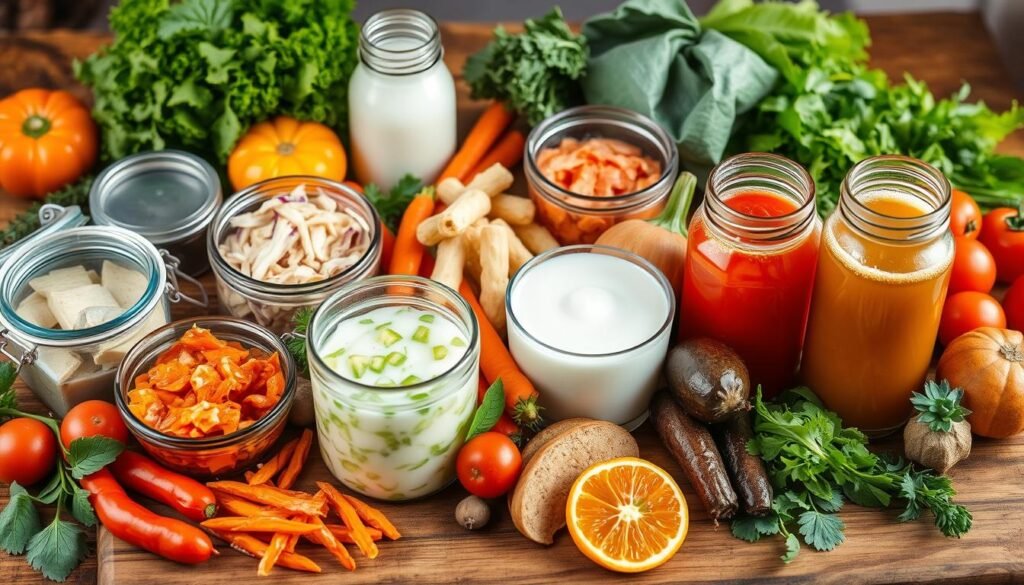Fermented foods have been around for almost 10,000 years. They were first used to keep food fresh. Today, we enjoy them for their taste and health benefits. Foods like Greek yogurt, kefir, and sourdough bread are full of good bacteria and yeast.
These foods help keep our gut healthy. A healthy gut is key to feeling good and staying well. Eating a mix of fermented foods is a smart way to keep your diet balanced and nutritious.
Key Takeaways
- Fermented foods have been part of the human diet for nearly 10,000 years, originally used for preservation.
- Consuming fermented foods can help balance the gut’s intestinal flora, leading to improved overall health.
- The gut, often called the “second brain,” influences mood, behavior, appetite, weight, and the immune system.
- Fermented foods can contribute to maintaining a healthy gut biome, which can aid in preventing or managing conditions like obesity.
- Incorporating a variety of fermented foods into a balanced diet can be beneficial for overall health and well-being.
Understanding the Ancient Art of Food Fermentation
Food fermentation has been around for thousands of years. It started in China around 7000 BC. People used fermented foods like rice, honey, and fruit to keep food fresh.
This process changes sugars into alcohols, carbon dioxide, and acids. It stops food from spoiling and makes it last longer.
The Historical Evolution of Fermented Foods
Fermentation has been a part of almost every culture for ages. In the early 1900s, Élie Metchnikoff found that soured milk helped Bulgarian peasants live longer. This made people more interested in fermented foods.
Studies have shown that fermentation makes food healthier. It adds good compounds and helps our gut health.
Key Fermentation Processes and Their Benefits
- Lactic acid fermentation turns sugars into lactic acid. This keeps food safe from harmful bacteria.
- Fermentation can make vegetables last all winter. This shows how it helps preserve food.
- Fermented grains are easy to digest and full of nutrients. They’re good for our gut.
- Fermented foods boost our digestion, immunity, and overall health. They make us healthier.
Traditional vs. Modern Fermentation Methods
Old methods used wild microbes, while new ones use specific bacteria. Homemade fermented foods taste better and are healthier than store-bought ones.
Canning and industrial processing can harm the good microbes in food. It’s best to choose live, fermented foods for better health.
| Traditional Fermentation | Modern Fermentation |
|---|---|
| Relies on wild microbes | Uses specific strains of lactic acid bacteria |
| Enhances taste and nutrition | Can degrade final product |
| Preserves beneficial microbes | Destroys beneficial microbes |
“Fermented foods have become popularized in modern food culture, with fermentation noted as a top food trend in 2013.”
The Science Behind Gut Health and Fermented Foods

The gut microbiome is filled with trillions of bacteria, crucial for our health. Fermented foods help balance this ecosystem, improving gut health. They aid in digesting complex carbs and fight off bad bacteria.
A diverse gut microbiome is linked to better health. A less diverse one is tied to chronic issues like obesity and asthma. Gut bacteria also make essential vitamins like B and K, vital for our bodies.
Recent studies highlight the benefits of fermented foods. A trial with 36 healthy adults showed eating these foods boosted microbial diversity. It also lowered 19 inflammatory proteins in their blood, showing their anti-inflammatory effects.
“Diet shapes the gut microbiome, affecting the immune system and overall health. Low microbiome diversity has been linked to obesity and diabetes.”
Foods like kefir, sauerkraut, natto, and sourdough bread are rich in beneficial microbes. They also reduce toxins and anti-nutrients, boosting their health benefits.
Eating a variety of fermented foods supports a healthy gut microbiome. This can lower the risk of chronic diseases and improve overall health. As research grows, fermented foods’ role in digestive health becomes clearer.
Essential Fermented Foods for Daily Consumption

Adding probiotic-rich fermented foods to your diet is easy and beneficial. These foods, like yogurt and kimchi, are packed with good bacteria, vitamins, and antioxidants. They support your gut health and overall well-being.
Probiotic-Rich Dairy Options
Yogurt and kefir are top choices for probiotics. Yogurt with the “Live & Active Cultures” seal has at least 100 million probiotic cultures per gram. Kefir, fermented with kefir grains, offers a variety of beneficial bacteria.
Studies show eating yogurt regularly may lower the risk of certain cancers, type 2 diabetes, and heart disease.
Plant-Based Fermented Alternatives
- Sauerkraut, a fermented cabbage dish, is full of vitamins C and K, and anti-inflammatory compounds.
- Kimchi, a Korean side dish, has Lactobacilli bacteria, dietary fiber, and antioxidants.
- Tempeh, a fermented soybean cake, is high in protein and may support gut, heart, and brain health.
- Kombucha, a fizzy fermented tea, is a probiotic-rich drink instead of sugary soda.
Traditional Asian Fermented Staples
Fermented foods are key in Asian cuisines, adding flavor and health benefits. Miso, a fermented soybean paste, may lower mortality risk. Apple cider vinegar can help control blood sugar and cholesterol.
Whether you prefer meat or plant-based foods, adding fermented foods to your diet is beneficial. They help create a healthy gut microbiome and offer many health benefits.
Health Benefits and Therapeutic Properties

Fermented foods are packed with health benefits, making them key to a balanced diet. They help lower blood pressure and boost mental health. These ancient foods are getting more attention for their healing properties.
One big plus of fermented foods is their ability to lower blood pressure. Foods like miso and natto, made from soy, are especially good at this. They help control high blood pressure and lower heart disease risk.
Fermented dairy, like low-fat yogurt and kefir, also has benefits. They can lower heart disease and bladder cancer risks. The live cultures in these foods support gut health, which is crucial for our overall health.
Foods like kimchi may prevent asthma and eczema by improving the immune system and reducing inflammation. They also help with bowel disorders like IBS and Crohn’s disease. This is because they fight inflammation and promote a healthy gut.
Interestingly, fermented foods can also improve mental health. They boost serotonin, which helps with thinking and mood. This makes them great for mental well-being.
Moreover, fermented foods can strengthen the immune system by supporting gut health. They help the body fight off illnesses and infections. They may also improve oral health by reducing plaque and cavity risk.
While we don’t know the exact amount needed, adding fermented foods to your diet can bring many health benefits.
“Fermented foods have regained popularity in Western diets emphasizing artisanal processes.”
Also Read : Quick Meals Under 20 Minutes: A Recipe Guide
Conclusion
Fermented foods are key to a balanced diet, offering many health benefits. They help with gut health, boost the immune system, and may prevent chronic diseases. With a wide variety of fermented foods worldwide, everyone can find something they like.
Studies show that eating fermented foods regularly is good for our health. They include probiotic-rich dairy, plant-based options, and traditional Asian foods. Adding these to our diet can improve our gut health, strengthen our immune system, and lower the risk of chronic diseases.
By eating a variety of fermented foods, we can take a big step towards better health. Fermentation is an ancient practice that helps us get the most out of our food. It makes our diet more nutritious and supports our overall well-being.
FAQs
Q: Why are fermented foods important for human health?
A: Fermented foods are important for human health because they enhance the gut microbiota, which plays a critical role in digestion, immunity, and overall well-being. Their consumption can lead to improved health outcomes and a reduction in the risk of certain diseases.
Q: What are some of the best fermented foods to include in a balanced diet?
A: Some of the best fermented foods include fermented milk products like yogurt, fermented vegetables such as sauerkraut, fermented soy like tempeh, and various fermented beverages like kefir and kombucha. These foods provide beneficial probiotics and enhance gastrointestinal health.
Q: How do fermented foods affect the gut microbiome?
A: Fermented foods positively impact the gut microbiome by promoting the growth of beneficial gut microbiota. This balance is crucial for maintaining gastrointestinal health and can help in preventing health issues related to gut dysbiosis.
Q: What is the relationship between fermented soy and human health?
A: Fermented soy products, like miso and tempeh, are rich in probiotics and can improve digestive health. They are associated with various health benefits, including reduced inflammation and better metabolic outcomes, making them a valuable addition to a balanced diet.
Q: How do probiotics and prebiotics found in fermented foods benefit human health?
A: Probiotics are live bacteria that confer health benefits, while prebiotics are substances that feed these beneficial bacteria. Together, they support the gut microbiota, enhance digestion, and may improve health outcomes related to gastrointestinal health and disease.
Q: Can the consumption of fermented foods improve health outcomes?
A: Yes, the consumption of fermented foods has been shown to improve health outcomes by enhancing the gut microbiome, supporting immune function, and potentially reducing the risk of various diseases, including gastrointestinal disorders.
Q: What are traditional fermented foods, and how do they differ from modern fermented foods?
A: Traditional fermented foods are those that have been made using age-old techniques passed down through generations, often using natural fermentation processes. They differ from modern fermented foods in that they typically do not contain artificial additives and may offer a broader range of probiotics and health benefits.
Q: What is the impact of fermented foods on gastrointestinal health?
A: Fermented foods positively impact gastrointestinal health by promoting a healthy gut microbiota, aiding digestion, and reducing symptoms of gastrointestinal disorders. Their regular consumption can lead to improved gut health and overall well-being.
Q: How can I incorporate more fermented foods into my diet?
A: To incorporate more fermented foods into your diet, you can start by adding yogurt or kefir to your breakfast, including sauerkraut or kimchi with meals, using miso in soups, or trying fermented beverages like kombucha as a refreshing drink option.

